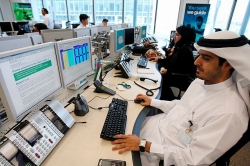
By Jon W. Anderson, Arab Media & Society, Summer, 2013
Nearly all studies and most opinion about new media and information technologies in the Middle East have held that they are a boon in an environment of information-averse regimes, state-controlled media, and limited communications. New media, in this reckoning, open communications to new voices, foster an expanded public sphere,[1] break the molds of old patterns not only of communication but also of thought,[2] or modify media ecologies[3]—all of which erode state monopolies and shift balances from state-cultivated models of citizenship to citizens’ taking charge.[4] Skeptical voices have been few, redundantly focused on multiple means of censorship to offset the benefits of new media, or cautioning against jumping to conclusions about new media impacts.[5] Early pessimistic assessments of the prospects for informational freedom in the digital age have been largely assimilated, such as Kalathil and Boas’ demonstration that the malleability of the Internet is also available to authoritarian states,[6] while more recent, more global, and more famous critiques have yet to influence research priorities in the Middle East.[7] None of these has strayed far from global views of epochal, structural transformation in open networks beyond noting lingering Middle East exceptions, especially lagging numbers of participants by comparison to other regions and to the rest of the world. Regionally as well as globally, open communications, network flows, and other notions of informationalization generally seem to be embraced as an unalloyed good by most analysts, if not by all actors.
“Informationalization†is a concept formulated by the Spanish sociologist Manuel Castells as a key characteristic of the “information age,â€[8] in which the balance of production that shifted from agriculture to manufacture with industrialization and then from manufacturing to service industries, shifts in post-industrial society toward information services and information technologies as dominant forces in economic, political, social and cultural change—or as Castells put it, “the new social morphology of our societies.â€[9] Notions of informationalization penetrate extensively into thinking about business, economic development and politics independently of Castells’ prolific treatments that linked it particularly to networked society. A turn-of-the-century favorite was the concept of “knowledge work†as a new denominator for development in post-industrial economies that the first Arab Human Development Report recommended for Arab countries to turn their “human resources†into human capital by embracing information and communications technology (ICTs).[10] We don’t hear much about knowledge workers any more, as attention to ICT-driven change has shifted to social media-enabled youth and from prosperity, which seems more elusive than ever, to freedom, which again seems just around the corner, so long as the tools and their users can stay a step ahead of its adversaries.
for the rest of this article, click here.
Notes
[1] Marc Lynch, “Blogging the New Arab Public” http://www.arabmediasociety.com/topics/index.php?t_article=32 (accessed 1 July 2012).Marc Lynch, Voices of the New Arab Public: Iraq, Al-Jazeera and Middle East Politics Today (New York: Columbia University Press, 2006).
[2] Charles Hirschkind, “From the Blogosphere to the Street: The Role of Social Media in the Egyptian Uprising” http://www.jadaliyya.com/pages/index/599/from-the-blogosphere-to-the-street_the-role-of-soc (accessed 23 December 2011).
[3] Barrie Axford, “Talk About a Revolution: Social Media and the Mena Uprisings,” Globalizations 8, no. 5 (2011); Mark Allen Peterson, “Egypt’s Media Ecology in a Time of Revolution” http://www.arabmediasociety.com/?article=770 (accessed 14 May 2013); Ramsey Tesdell, “Reach out and Touch Somebody: The Ecology of New Media and New Social Movements in Jordan” http://www.arabmediasociety.com/?article=729 (accessed 16 May 2013).
[4] Donatella Della Ratta, “Dramas of the Authoritarian State: The Politics of Syrian Tv Serials in the Pan Arab Market†(University of Copenhagen, Faculty of Humanities, 2013).pp. 146 ff.
[5] Jon B. Alterman, “The Revolution Will Not Be Tweeted,” Washington Quarterly 34, no. 4 (2011).
[6] Shanthi Kalathil and Taylor C. Boas, Open Networks, Closed Regimes: The Impact of the Internet on Authoritarian Rule (Washington, DC: Carnegie Endowment for International Peace, 2003).
[7] Evgeny Morozov, The Net Delusion: The Dark Side of Internet Freedom (New York: Public Affairs Press, 2011). And Lawrence Lessig’s Code and Other Laws of Cyberspace (New York: Basic Books, 1999).
[8] Manuel Castells, The Information Age: Economy, Society and Culture. Vol. 1, the Rise of the Network Society (Malden, MA: Blackwell, 1996).
[9] Castells 1996, p. 500.
[10] The Arab Human Development Report 2002: Creating Opportunities for Future Generations (New York: United Nations Development Programme (UNDP), Regional Bureau for Arab states, 2002).
for the rest of this article, click here.